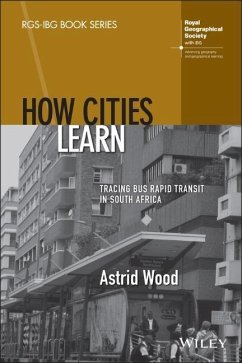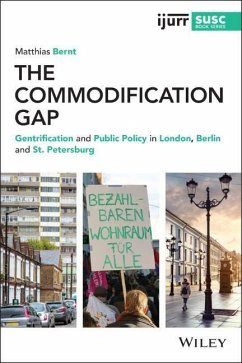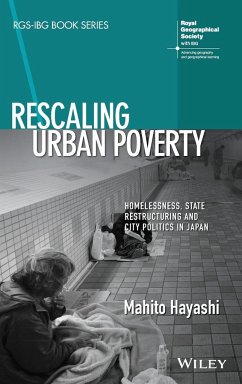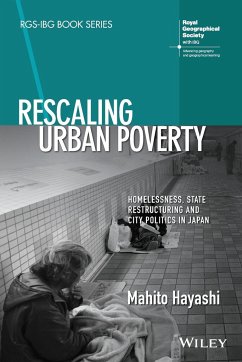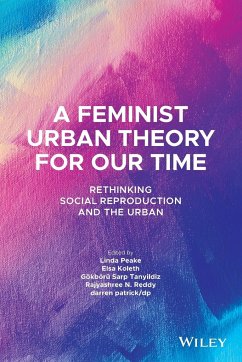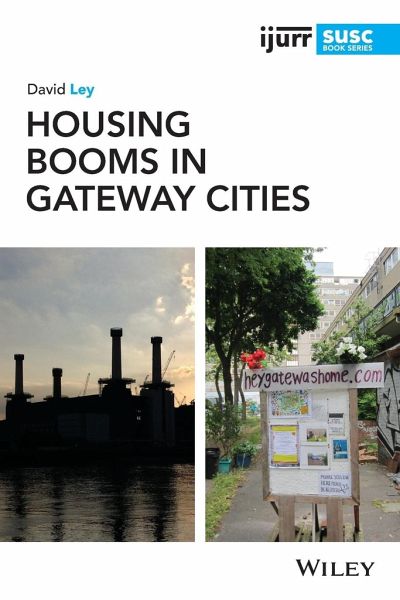
Housing Booms in Gateway Cities
Versandkostenfrei!
Versandfertig in über 4 Wochen
32,99 €
inkl. MwSt.
Weitere Ausgaben:

PAYBACK Punkte
16 °P sammeln!
HOUSING BOOMS IN GATEWAY CITIES"David Ley examines the development of housing booms, and policies intended to stimulate or limit them. Utilising a comparative approach in five gateway cities, he provides a superb understanding of the politics of booms, lifting the debate beyond narrow housing and real estate studies. This book is required reading for anyone interested in global cities, housing markets, or comparative urbanism."--Manuel B. Aalbers, Professor of Human Geography, KU Leuven, Belgium"A stellar contribution to housing and its financialisation as central to the capitalist project glo...
HOUSING BOOMS IN GATEWAY CITIES
"David Ley examines the development of housing booms, and policies intended to stimulate or limit them. Utilising a comparative approach in five gateway cities, he provides a superb understanding of the politics of booms, lifting the debate beyond narrow housing and real estate studies. This book is required reading for anyone interested in global cities, housing markets, or comparative urbanism."
--Manuel B. Aalbers, Professor of Human Geography, KU Leuven, Belgium
"A stellar contribution to housing and its financialisation as central to the capitalist project globally, Housing Booms offers a wonderful window into the ascendancy of the secondary circuit of real estate in Singapore, Hong Kong, Sydney, Vancouver, and London. Critically, through careful, empirically rigorous comparison, an eminent urban social scientist urges us to understand the importance of placing urban housing theoretically."
--Loretta Lees, Director of theInitiative on Cities, Boston University
"Mastering a wealth of information and insights from five gateway cities, David Ley provides fresh and inspiring explanation of both common global logics and diverse local trajectories of housing booms in the era of financialisation and asset-based accumulation. A timely and ground-breaking contribution, (re)positioning housing to the centrality pervasively felt in everyday life but largely unacknowledged in mainstream social science."
--George Lin, Chair Professor of Geography, University of Hong Kong
In Housing Booms in Gateway Cities, renowned geographer Dr. David Ley delivers a detailed exploration of housing markets in Hong Kong, Singapore, Sydney, Vancouver, and London and explains why these gateway cities have seen dramatic increases in residential real estate prices since the 1980s. The author describes how the globalization of real estate has rapidly inflated demand and uncoupled local housing prices from local wages, causing acute problems of affordability, availability, and inequality. The book implicates government policy in massive real estate price inflation, describing a shift from welfare-based to asset-based societies. It also highlights the relatively unique experience in Singapore, where asset-based housing policy has encouraged the dispersion of ownership and accumulation through an increased supply of subsidized leasehold apartments and the regulation of disruptive investment flows.
Housing Booms in Gateway Cities is an ideal resource for academics, students and policymakers with an interest in urban geography, sociology, and planning, housing studies, and any of the cities discussed in the book. It is an innovative treatment of housing as a central category in wealth accumulation in urban economies and societies.
"David Ley examines the development of housing booms, and policies intended to stimulate or limit them. Utilising a comparative approach in five gateway cities, he provides a superb understanding of the politics of booms, lifting the debate beyond narrow housing and real estate studies. This book is required reading for anyone interested in global cities, housing markets, or comparative urbanism."
--Manuel B. Aalbers, Professor of Human Geography, KU Leuven, Belgium
"A stellar contribution to housing and its financialisation as central to the capitalist project globally, Housing Booms offers a wonderful window into the ascendancy of the secondary circuit of real estate in Singapore, Hong Kong, Sydney, Vancouver, and London. Critically, through careful, empirically rigorous comparison, an eminent urban social scientist urges us to understand the importance of placing urban housing theoretically."
--Loretta Lees, Director of theInitiative on Cities, Boston University
"Mastering a wealth of information and insights from five gateway cities, David Ley provides fresh and inspiring explanation of both common global logics and diverse local trajectories of housing booms in the era of financialisation and asset-based accumulation. A timely and ground-breaking contribution, (re)positioning housing to the centrality pervasively felt in everyday life but largely unacknowledged in mainstream social science."
--George Lin, Chair Professor of Geography, University of Hong Kong
In Housing Booms in Gateway Cities, renowned geographer Dr. David Ley delivers a detailed exploration of housing markets in Hong Kong, Singapore, Sydney, Vancouver, and London and explains why these gateway cities have seen dramatic increases in residential real estate prices since the 1980s. The author describes how the globalization of real estate has rapidly inflated demand and uncoupled local housing prices from local wages, causing acute problems of affordability, availability, and inequality. The book implicates government policy in massive real estate price inflation, describing a shift from welfare-based to asset-based societies. It also highlights the relatively unique experience in Singapore, where asset-based housing policy has encouraged the dispersion of ownership and accumulation through an increased supply of subsidized leasehold apartments and the regulation of disruptive investment flows.
Housing Booms in Gateway Cities is an ideal resource for academics, students and policymakers with an interest in urban geography, sociology, and planning, housing studies, and any of the cities discussed in the book. It is an innovative treatment of housing as a central category in wealth accumulation in urban economies and societies.






